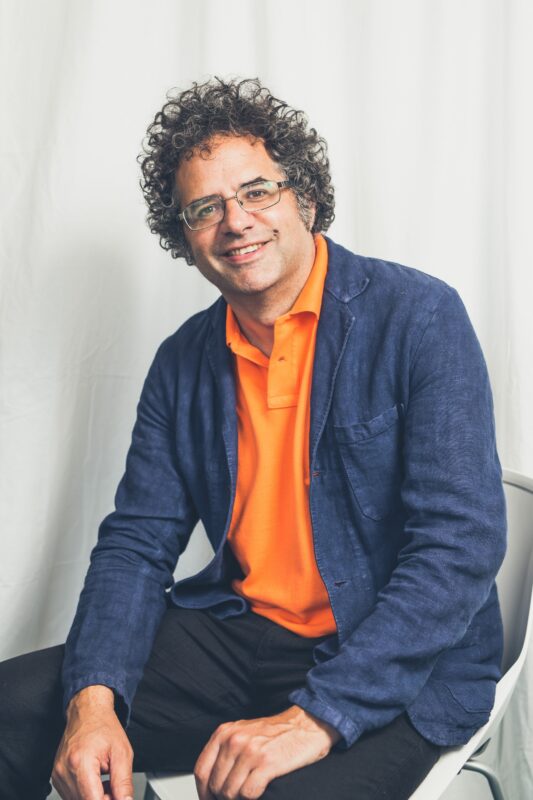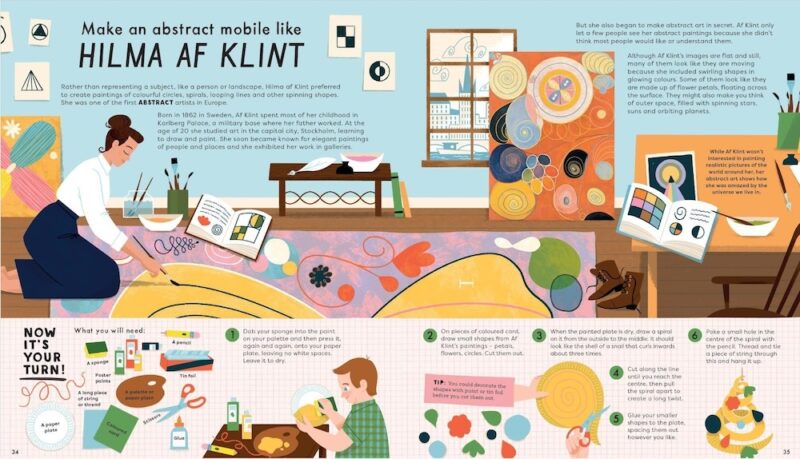
‘An intellectual joy’: Yuval Noah Harari. Photograph: Antonio Olmos for the Observer New Review
Last week, on his Radio 2 breakfast show, Chris Evans read out the first page of Sapiens, the book by the Israeli historian Yuval Noah Harari. Given that radio audiences at that time in the morning are not known for their appetite for intellectual engagement – the previous segment had dealt with Gary Barlow’s new tour – it was an unusual gesture. But as Evans said, “the first page is the most stunning first page of any book”.
If DJs are prone to mindless hyperbole, this was an honourable exception. The subtitle of Sapiens, in an echo of Stephen Hawking’s great work, is A Brief History of Humankind. In grippingly lucid prose, Harari sets out on that first page a condensed history of the universe, followed by a summary of the book’s thesis: how the cognitive revolution, the agricultural revolution and the scientific revolution have affected humans and their fellow organisms.
It is a dazzlingly bold introduction, which the remainder of the book lives up to on almost every page. Although Sapiens has been widely and loudly praised, some critics have suggested that it is too sweeping. Perhaps, but it is an intellectual joy to be swept along.
It’s one of those books that can’t help but make you feel smarter for having read it. Barack Obama and Bill Gates have undergone that experience, as have many others in the Davos crowd and Silicon Valley. The irony, perhaps, is that one of the book’s warnings is that we are in danger of becoming an elite-dominated global society.
At the centre of the book is the contention that what made Homo sapiens the most successful human being, supplanting rivals such as Neanderthals, was our ability to believe in shared fictions. Religions, nations and money, Harari argues, are all human fictions that have enabled collaboration and organisation on a massive scale.
Originally published in Hebrew in 2011, the book was translated into English three years later and became an international bestseller. It ranges across a multitude of disciplines with seemingly effortless scholarship, bringing together a keen understanding of history, anthropology, zoology, linguistics, philosophy, theology, economics, psychology, neuroscience and much else besides.
Yet the author of this accomplished and far-reaching book is a young Israeli historian whose career, up until that point, had been devoted to the relative academic backwater of medieval military history. Apparently, Sapiens is based on an introductory course to world history that Harari had to teach, after senior colleagues dodged the task. The story goes that the major Israeli publishers weren’t interested. No one saw international stardom beckoning.
Last year, Harari’s follow-up, Homo Deus: A Brief History of Tomorrow, was published in the UK, becoming another bestseller. It develops many of the themes explored in Sapiens, and in particular examines the possible impact of biotechnological and artificial intelligence innovation on Homo sapiens, heralding perhaps the beginning of a new bionic or semi-computerised form of human.
Again, it’s an exhilarating book that takes the reader deep into questions of identity, consciousness and intelligence, grappling with what kinds of choices and dilemmas a fully automated world will present us with.
Now 41, Harari grew up in a secular Jewish family in Haifa. He studied history at the Hebrew University of Jerusalem and completed his doctorate at Oxford. He is a vegan and he meditates for two hours a day, often going on extended retreats. He says it helps him focus on the issues that really matter. He lives with his husband on a moshav, an agricultural co-operative, outside Jerusalem. Being gay, he says, helped him to question received opinions. “Nothing should be taken for granted,” he has said, “even if everybody believes it.”
One of the pleasures of reading his books is that he continually calls on readers, both explicitly and implicitly, to think about what we know and what we think we know. And he has little time for fashionable stances.
He writes and speaks like a man who is not excessively troubled by doubt. If that makes him sound arrogant, let me clarify: he arrives at his conclusions after a great deal of research and contemplation. However, once he’s persuaded himself – and he says he always leaves it to the evidence to decide his thinking – he doesn’t hold back in his efforts to persuade the reader. It makes for what Jared Diamond called “unforgettably vivid language”.
Harari is a naturally gifted explainer, invariably ready with the telling anecdote or memorable analogy. As a result, it’s tempting to see him less as a historian than as some kind of all-purpose sage. We asked public figures and readers to pose questions for Harari, and many of these ( below) were of a moral or ethical nature, seeking answers about what should be done, rather than about what has happened. But the Israeli seems used to the role, and perfectly happy to give his best shot at replying. A historian of the distant past and the near future, he has carved out a whole new discipline of his own. It’s a singular achievement by an impressively multiple-minded man.

We are living through a fantastically rapid globalisation. Will there be one global culture in the future or will we maintain some sort of deliberate artificial tribal groupings?
Helen Czerski, physicist
I’m not sure if it will be deliberate but I do think we’ll probably have just one system, and in this sense we’ll have just one civilisation. In a way this is already the case. All over the world the political system of the state is roughly identical. All over the world capitalism is the dominant economic system, and all over the world the scientific method or worldview is the basic worldview through which people understand nature, disease, biology, physics and so forth. There are no longer any fundamental civilisational differences.
Andrew Anthony: Are you saying that the much-maligned Francis Fukuyama was correct in his analysis of the end of history?
It depends how you understand the end of history. If you mean the end of ideological clashes, then no, but if you mean the creation of a single civilisation which encompasses the whole world, then I think he was largely correct.

What is the biggest misconception humanity has about itself?
Lucy Prebble, playwright
Maybe it is that by gaining more power over the world, over the environment, we will be able to make ourselves happier and more satisfied with life. Looking again from a perspective of thousands of years, we have gained enormous power over the world and it doesn’t seem to make people significantly more satisfied than in the stone age.
Is there a real possibility that environmental degradation will halt technological progress?
TheWatchingPlace, posted online
I think it will be just the opposite – that, as the ecological crisis intensifies, the pressure for technological development will increase, not decrease. I think that the ecological crisis in the 21st century will be analogous to the two world wars in the 20th century in serving to accelerate technological progress.
As long as things are OK, people would be very careful in developing or experimenting in genetic engineering on humans or giving artificial intelligence control of weapon systems. But if you have a serious crisis, caused for example by ecological degradation, then people will be tempted to try all kinds of high-risk, high-gain technologies in the hope of solving the problem, and you’ll have something like the Manhattan Project in the second world war.

What role does morality play in a future world of artificial intelligence, artificial life and immortality? Will an aspiration to do what is good and right still motivate much of the race?
Andrew Solomon, writer
I think morality is more important than ever before. As we gain more power, the question of what we do with it becomes more and more crucial, and we are very close to really having divine powers of creation and destruction. The future of the entire ecological system and the future of the whole of life is really now in our hands. And what to do with it is an ethical question and also a scientific question.
So to give just a simple example: what happens if several pedestrians jump in front of a self-driving car and it has to choose between killing, say, five pedestrians or swerving to the side and killing its owner? Now you have engineers producing the self-driving cars and they need to get an answer to this question. So I don’t see any reason to think that AI or bioengineering will make morality any less relevant than before.

After reading Homo Deus I began to wonder why we are so wilfully ushering in a future that will slowly make us redundant. We are the only animal obsessed with progress. Should we try to resist the idea of the future as one of inevitable technological advancement and create a different kind of futurism?
Matt Haig, author
You can’t just stop technological progress. Even if one country stops researching artificial intelligence, some other countries will continue to do it. The real question is what to do with the technology. You can use exactly the same technology for very different social and political purposes. If you look at the 20th century, we see that with the same technology of electricity and trains, you could create a communist dictatorship or a liberal democracy. And it’s the same with artificial intelligence and bioengineering. So I think people shouldn’t be focused on the question of how to stop technological progress because this is impossible. Instead the question should be what kind of usage to make of the new technology. And here we still have quite a lot of power to influence the direction it’s taking.
Will humans always find ways to hate each other, or do you lean more towards Steven Pinker’s view that society is much less violent than it used to be, and that this trend is set to continue?
Sarah Shubinsky, reader
I tend to agree with Steven Pinker. We now live in the most peaceful era in history. There is definitely still violence – I live in the Middle East so I know this perfectly well. But, comparatively, there is less violence than ever before in history. Today more people die from eating too much than from human violence, which is really an amazing achievement. We can’t be certain about the future but some changes make this trend seem robust. First of all, there is the threat of nuclear war which was perhaps the chief reason for the decline of war since 1945, and this threat is still there. And secondly, you have the change in the nature of the economy – that the economy switched from being a material-based economy to the knowledge-based economy.
In the past, the main economic assets were material – things like wheat fields and gold mines and slaves. So war made good sense because you could enrich yourself by waging war against your neighbours. Now the main economic asset is knowledge, and it’s very difficult to conquer knowledge through violence. Most of the large conflicts in the world today are still in those areas like the Middle East, where the main source of wealth is material – it’s oil and gas.

You said that our predilection to create abstract concepts such as religion, nationality etc is the quality which singled out sapiens from other hominids. Given that is also the inspiration for wars that may bring about our destruction, is it a strength or a weakness?
Esther Rantzen, broadcaster
In terms of power, it’s obvious that this ability made Homo sapiens the most powerful animal in the world, and now gives us control of the entire planet. From an ethical perspective, whether it was good or bad, that’s a far more complicated question. The key issue is that because our power depends on collective fictions, we are not good in distinguishing between fiction and reality. Humans find it very difficult to know what is real and what is just a fictional story in their own minds, and this causes a lot of disasters, wars and problems.
The best test to know whether an entity is real or fictional is the test of suffering. A nation cannot suffer, it cannot feel pain, it cannot feel fear, it has no consciousness. Even if it loses a war, the soldier suffers, the civilians suffer, but the nation cannot suffer. Similarly, a corporation cannot suffer, the pound sterling, when it loses its value, it doesn’t suffer. All these things, they’re fictions. If people bear in mind this distinction, it could improve the way we treat one another and the other animals. It’s not such a good idea to cause suffering to real entities in the service of fictional stories.
AA: But these fictions often inspire us to do great things. Would an unblinking view of reality create the same motivation?
We certainly need some fictions in order to have large-scale societies. That’s true. But we need to use these fictions to serve us instead of being enslaved by them. A good analogy is maybe a football game. The laws of the game are fictional, they’re a creation of humans, there is nothing in nature that mandates the laws of the football game. As long as you remember that these are just laws that people invented to serve your aim, then you can play the game. If you completely give up these laws because they are fictional, then you can’t play football.

So I’m certainly not recommending that people stop using all these fictional entities. You cannot have a large-scale economy if you don’t use money. But you can use money in the same way you use the football laws, and still remember that this is just our creation. And similarly with the nation. There is nothing wrong in principle in having feelings of loyalty towards the group. But when you forget that this is a human creation, then you can end up sacrificing millions of people for the interests of the nation, forgetting that it’s the people who invented it.
Is being compassionate and empathetic a major flaw in human evolution? Is psychopathy the future for our species?
Dominic Currie, reader
No, I don’t think so. First of all, if it is, then it’s going to be quite a terrible future. But even if we leave aside the moral aspect and just look at it from a practical aspect, then human power comes from cooperation, and psychopaths are not very good at cooperation. You need empathy and compassion, you need the ability to understand and to sympathise with other people in order to cooperate with them effectively. So even if we leave aside all moral issues, still I don’t think that empathy is bad for us or that psychopaths are the future of humankind.
AA: You argue that humanism is a product of capitalism. Is it inseparable from capitalism?
There are close connections between them but I don’t think they are inseparable. They can certainly go along different ways in the 21st century. One of the big dangers we face is exactly the separation of capitalism from humanism, especially from liberal humanism. In the last decades the main reason why governments all over the world liberalised their politics and economics is not because they were convinced of the ethical arguments of humanism, but rather because they thought it will be good for the capitalist economy.
Now the fear is that in the 21st century capitalism and humanism will be separated, and you could have very sophisticated and advanced economies without any need to liberalise your political system or to give freedom to invest in the education and welfare of the masses.

Was the move from hunter-gathering to farming a mistake? If so, how can we make the best of it now?
Philippa Perry, writer and psychotherapist
It depends on your perspective. If you’re talking from the perspective of a pharaoh or some ancient Chinese emperor, then it was a very good idea. If you look at it from the perspective of a simple peasant woman in ancient Egypt, then it looks like a pretty bad idea. If you look at it from the perspective of the middle classes in the affluent societies of today, then again it looks like a very good idea. If you look at it from the perspective of somebody in Bangladesh who works 12 hours a day in a sweatshop, again it looks like a bad idea.
There is absolutely no way to turn back the clock, with 8 billion people returning to living as hunter-gatherers. So the question is really how to make the best of our current situation, and how not to repeat the mistakes of the agricultural revolution. With the new revolution in artificial intelligence and biotechnology, there is a danger that again all the power and benefits will be monopolised by a very small elite, and most people will end up worse off than before.
You said animal farming might be “the worst crime in history”. What advice do you have for helping society end it?
Jacy Reese, reader
Our best chance is with what is known as cellular agriculture or clean meat, which is the idea of creating meat from cells and not from animals. If you want a steak, you just grow a steak from cells – you don’t need to raise a cow and then slaughter the cow for the steak. This may sound like science fiction but it’s already a reality. Three years ago they created the first hamburger they made from cells. It’s true that it cost $300,000 but it’s always like that with a new technology. By now, 2017, the price, as far as I know, is down to $11 per hamburger. And the developers expect, that, given enough investment and the proper research, they could bring down the price to less than a slaughtered meat hamburger within, I don’t know, 10 years or so.
It’s still some way before you see it in the supermarket and in McDonald’s, but I think that’s the only viable solution. I’m vegan, and I try to avoid meat and other animal products, but I’m under no illusion that I can convince billions of other people to give up completely meat and milk and so forth. But if we can produce them from cells, then great. It will also have a lot of ecological benefits because it will reduce the enormous amount of pollution which is caused by high animal farming today.

Does the phrase “the modern mind” mean anything to you, and if so when was the modern mind born and what does it look like?
Bettany Hughes, historian
We know very little about the mind. We don’t understand what it is, what are its functions and how it emerged. When billions of neurons in the brain fire electrical charges in a particular pattern, how does this create the mental experience, the subjective experience of love or anger or pain or pleasure? We have absolutely no idea. And because we understand so little about the mind, we also don’t know how and why it emerged in the first place. We assume that the people in the late stone age who drew the cave art of Lascaux and Altamira had fundamentally the same minds as we have today. And we also assume that Neanderthals had a different kind of mind, even though they had bigger brains than ours. But the details at present are far beyond our understanding.
AA: You live in a part of the world that has been shaped by religious fictions. Which do you think will happen first – that Homo sapiens leave behind religious fiction or the Israel-Palestine conflict will be resolved?
As things look at present, it seems that Homo sapiens will disappear before the Israeli political conflict will be resolved. I think that Homo sapiens as we know them will probably disappear within a century or so, not destroyed by killer robots or things like that, but changed and upgraded with biotechnology and artificial intelligence into something else, into something different. The timescale for that kind of change is maybe a century. And it’s quite likely that the Palestinian-Israeli conflict will not be resolved by that time. But it will definitely be influenced by it.
Would we and all the other species on this planet have been better off without the cognitive revolution? Would we then still be living in harmony with all the other forms of life instead of dominating them and making ourselves unhappy in the process?
NassauOrange, posted online
I’m not sure about harmony because there is also a lot of violence and disharmony between other species. But we definitely would not have dominated the planet if we did not undergo the cognitive revolution. And then, also, you would not have the ecological crisis that the planet now faces. So yes, without a cognitive revolution, I guess most other organisms, most other big animals, would be much better off.

What concerns you most about the world, and what are you doing about your concerns?
LeaActforChange, posted online
There are so many different concerns that I’m not sure which is the biggest one. At present, because of the enormous power of humankind, maybe the biggest concern of all is human blindness and stupidity. We’re an extremely wise species in so many ways but when it comes to making important decisions we have this tendency sometimes to make these terrible mistakes, and we are now in a situation when we just don’t have much room for error. As we gain more and more power, the consequences of making a stupid choice are catastrophic for us and for the entire ecological system. So this is a great cause for concern.
Is anti-intellectualism is rising in the west? If so, is there a relation between the rise of anti-intellectualism and the decline of liberalism?
guneydas, posted online
I’m not sure that it’s rising. It’s definitely there but it was always there, and I’m not sure if the situation now is worse than in the 1950s or 1930s or the 19th century or the middle ages. So yeah, it’s definitely a concern. And I would say it’s not so much anti-intellectualism as much as anti-science. Because even the most fundamentalist religious fanatics, they are intellectuals. They give far too much importance to the human intellect. One of the problems with a lot of religious fanaticism is that it gives far too much importance to the creations of the human intellect and far too little to empirical evidence from the world outside us.
AA: Are you confident that radical Islam is nothing more than the death rattle of the pre-modern era?
In the 21st century, humanity is facing some very difficult problems, whether it’s global warming or global inequality or the rise of disruptive technology, such as bioengineering and artificial intelligence. And wWe need answers to these challenges, and – at least as of March 2017 – I haven’t heard anything relevant being offered by radical Islam. So this is why I don’t think that radical Islam will shape the society of the 21st century. It could still be there, it could still cause a lot of trouble and violence and so forth, but I don’t see it creating or shaping the road ahead of humankind.

You’re clearly a big-picture guy, so what do you do to recharge and get the perspective that you need for your work?
Arianna Huffington, entrepreneur
I read a very large number of books from all fields, all disciplines. I usually start with a big question, such as whether people today are happier than in the past, or why men have dominated women in most human societies. And then I follow the question instead of trying to follow my own answer, even if it means I can’t formulate any clear theory.
AA: What does meditation do for you?
Above all it enables me to try and see reality as it is. When we try to observe the world, and when we try to observe ourselves, the mind constantly generates stories and fictions and explanations and imposes them on reality, and we cannot see what is really happening because we are blinded by the fictions and stories that we create or other people create and we believe. Meditation for me is just to see reality as it is – don’t get entangled in any story, in any fiction.
How would you advise the individual who wants to live a good life and contribute to the wellbeing of those not yet born as well as those already here?
Paul Baker, reader
Get to know yourself better, and especially what you really want from life, because otherwise technology tends to dictate to people their aims in life, and instead of technology serving us to realise our aims, we become enslaved to its agenda. And it’s very difficult to know what you really want from life. I’m not saying it’s an easy task.
AA: If we can indefinitely prevent death, would it still be possible to create meaning without what Saul Bellow called “the dark backing that a mirror needs if we are to see anything”?
I think so, yes. You have other problems with what happens when you overcome old age, but I don’t think lack of meaning will be a serious problem. Over the past three centuries, almost all the new ideologies of the modern world don’t care about death, or at least they don’t see death as a source of meaning. Previous cultures, especially traditional religions, usually needed death in order to explain the meaning of life. Like in Christianity – without death, life has no meaning. The whole meaning of life comes from what happens to you after you die. There is no death, no heaven, no hell… there is no meaning to Christianity. But over the past three centuries we have seen the emergence of a lot of modern ideologies such as socialism, liberalism, feminism, communism that don’t need death at all in order to provide life with meaning.
Sapiens and Homo Deus are published by Vintage at £9.99 and £8.99. To order copies for £8.49 and £7.64 respectively go to bookshop.theguardian.com or call 0330 333 6846. Free UK p&p over £10, online orders only. Phone orders min p&p of £1.99
guardian.co.uk © Guardian News & Media Limited 2010
Published via the Guardian News Feed plugin for WordPress.







